高考英语简单句导学案
2023届高考英语单元知识点导学案(通用3篇)
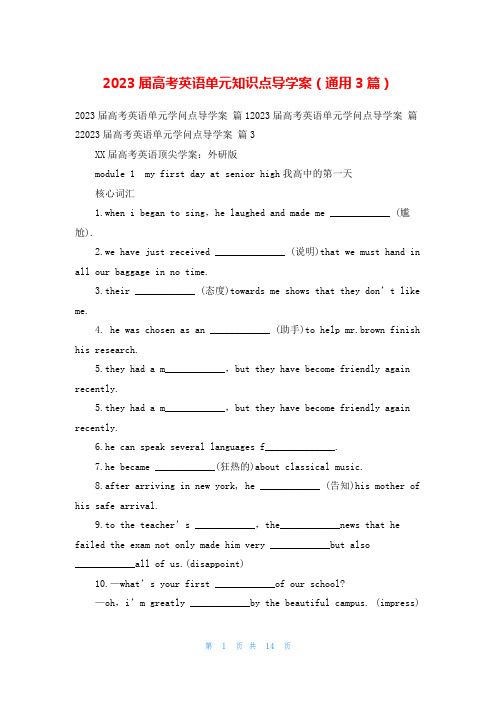
2023届高考英语单元知识点导学案(通用3篇)2023届高考英语单元学问点导学案篇12023届高考英语单元学问点导学案篇22023届高考英语单元学问点导学案篇3XX届高考英语顶尖学案:外研版module 1 my first day at senior high我高中的第一天核心词汇1.when i began to sing,he laughed and made me ____________ (尴尬).2.we have just received ______________ (说明)that we must hand in all our baggage in no time.3.their ____________ (态度)towards me shows that they don’t like me.4. he was chosen as an ____________ (助手)to help mr.brown finish his research.5.they had a m____________,but they have become friendly again recently.5.they had a m____________,but they have become friendly again recently.6.he can speak several languages f______________.7.he became ____________(狂热的)about classical music.8.after arriving in new york, he ____________ (告知)his mother of his safe arrival.9.to the teacher’s ____________,the____________news that he failed the exam not only made him very ____________but also____________all of us.(disappoint)10.—what’s your first ____________of our school?—oh,i’m greatly ____________by the beautiful campus. (impress)高频短语1.______________ 与……相像2.______________ 一点也不像;没有什么比得上3.______________ 单独地;独自地4.______________ 换句话说5.______________ 期盼;希望6.________________ 在……开头/结束的时候7.______________ 被(划)分成……8.______________ 参与9.______________ 远离;离……远10.______________ 上高校重点句式1.every room has a computer with a special screen,almost____________a cinema screen.每间教室都配备有一台电脑,电脑屏幕是和电影院屏幕大小差不多的特别屏幕。
高考英语一轮复习 常用80个重要句型导学案
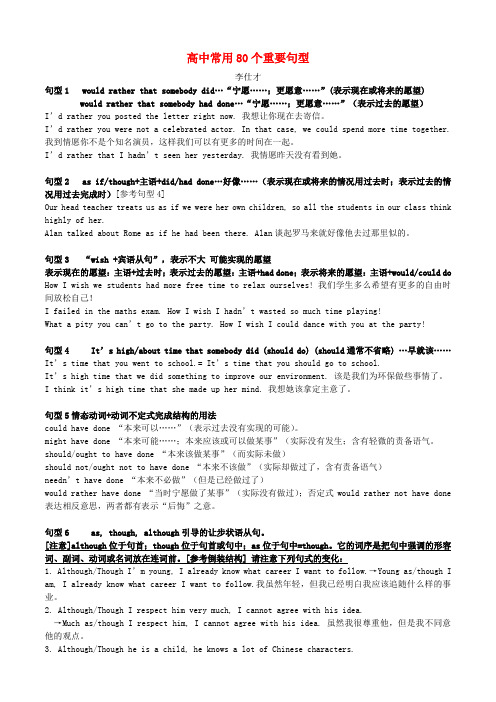
高中常用80个重要句型李仕才句型1 would rather that somebody did…“宁愿……;更愿意……”(表示现在或将来的愿望) would rather that somebody had done…“宁愿……;更愿意……”(表示过去的愿望)I’d rather you posted the letter right now. 我想让你现在去寄信。
I’d rather you were not a celebrated actor. In that case, we could spend more time together. 我到情愿你不是个知名演员,这样我们可以有更多的时间在一起。
I’d rather that I hadn’t seen her yesterday. 我情愿昨天没有看到她。
句型2 as if/though+主语+did/had done…好像……(表示现在或将来的情况用过去时;表示过去的情况用过去完成时)[参考句型4]Our head teacher treats us as if we were her own children, so all the students in our class think highly of her.Alan talked about Rome as if he had been there. Alan谈起罗马来就好像他去过那里似的。
句型3 “wish +宾语从句”,表示不大可能实现的愿望表示现在的愿望:主语+过去时;表示过去的愿望:主语+had done;表示将来的愿望:主语+would/could do How I wish we students had more free time to relax ourselves! 我们学生多么希望有更多的自由时间放松自己!I failed in the maths exam. How I wish I hadn’t wasted so much time playing!What a pity you can’t go to the party. How I wish I could dance with you at the party!句型4 It’s high/about time that someb ody did (should do) (should通常不省略) …早就该……It’s time that you went to school.= It’s time that you should go to school.It’s high time that we did something to improve our environment. 该是我们为环保做些事情了。
Lesson 3简单句的五种基本结构 导学案
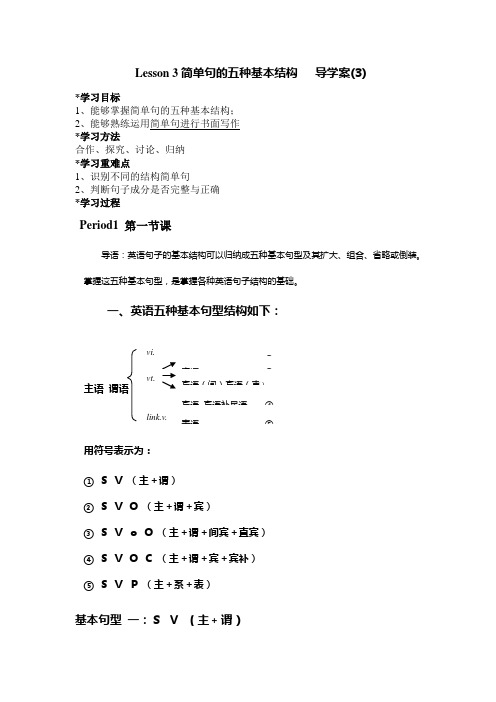
Lesson 3简单句的五种基本结构 导学案(3)*学习目标1、能够掌握简单句的五种基本结构;2、能够熟练运用简单句进行书面写作 *学习方法合作、探究、讨论、归纳 *学习重难点1、识别不同的结构简单句2、判断句子成分是否完整与正确 *学习过程Period1 第一节课导语:英语句子的基本结构可以归纳成五种基本句型及其扩大、组合、省略或倒装。
掌握这五种基本句型,是掌握各种英语句子结构的基础。
一、英语五种基本句型结构如下:主语 谓语用符号表示为:① S V (主+谓)② S V O (主+谓+宾)③ S V o O (主+谓+间宾+直宾) ④ S V O C (主+谓+宾+宾补) ⑤ S V P (主+系+表)基本句型 一:S V (主+谓)这类句子的谓语动词都是不及物动词,都不带宾语,但可以带状语,常见的不及物动词有: act, come, go, work, last, fall, cry, disappear, appear, smile, rise,ring ,live, look, listen, laugh, hurry, talk, sleep, retire, graduate, die, care, agree, jump, fail, wait, succeed, stay, sit, lie, shine, happen, take place, rain, snow, ect.如:It is raining now. (S V) We've worked for 5 hours. (S V)The meeting lasted half an hour. (S V) Time flies. (S V)Exercise 1 分析下列句子成分,并在后面括号内标明属于五种基本句型中的哪一种vi.vt . link.v. 宾语 宾语(间)宾语(直) 宾语 宾语补足语 表语①⑤② ④ ③1.Dark clouds hung overhead. ( )2.Gradually a smile appeared on her face. ( )3.He is smiling all over his face. ( )4.I did well in English. ( )5.He talked loudly in the classroom yesterday. ( )基本句型二:SVP(主+系+表)系动词主要是be. 但还有一些动词有些时候也可作系动词,有人称之为半系动词。
高考英语一轮复习《简单句、并列句、复合句》教案新人教版
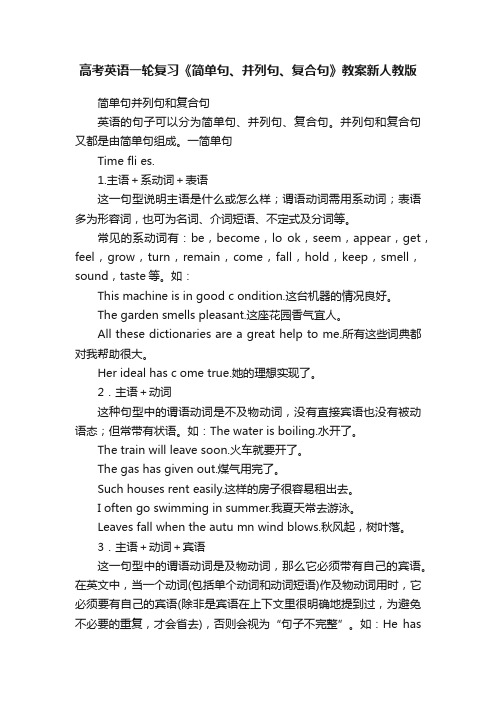
高考英语一轮复习《简单句、并列句、复合句》教案新人教版简单句并列句和复合句英语的句子可以分为简单句、并列句、复合句。
并列句和复合句又都是由简单句组成。
一简单句Time fli es.1.主语+系动词+表语这一句型说明主语是什么或怎么样;谓语动词需用系动词;表语多为形容词,也可为名词、介词短语、不定式及分词等。
常见的系动词有:be,become,lo ok,seem,appear,get,feel,grow,turn,remain,come,fall,hold,keep,smell,sound,taste等。
如:This machine is in good c ondition.这台机器的情况良好。
The garden smells pleasant.这座花园香气宜人。
All these dictionaries are a great help to me.所有这些词典都对我帮助很大。
Her ideal has c ome true.她的理想实现了。
2.主语+动词这种句型中的谓语动词是不及物动词,没有直接宾语也没有被动语态;但常带有状语。
如:The water is boiling.水开了。
The train will leave soon.火车就要开了。
The gas has given out.煤气用完了。
Such houses rent easily.这样的房子很容易租出去。
I often go swimming in summer.我夏天常去游泳。
Leaves fall when the autu mn wind blows.秋风起,树叶落。
3.主语+动词+宾语这一句型中的谓语动词是及物动词,那么它必须带有自己的宾语。
在英文中,当一个动词(包括单个动词和动词短语)作及物动词用时,它必须要有自己的宾语(除非是宾语在上下文里很明确地提到过,为避免不必要的重复,才会省去),否则会视为“句子不完整”。
高中英语简单句的教学设计

高中英语简单句的教学设计引言:高中英语教学中,简单句是基础且重要的教学内容之一。
通过教授学生简单句的搭配和用法,可以有效提升学生的语言表达能力和阅读理解能力。
本文将探讨高中英语简单句的教学设计,包括教学目标、教学步骤、教学方法以及评估方式等。
一、教学目标:1. 学生能够理解和使用基本的英语简单句。
2. 学生能够正确选择主谓一致的句子结构。
3. 学生能够准确运用简单句进行口语交际和书面表达。
4. 学生能够通过简单句的阅读理解,提取关键信息。
二、教学步骤:1. 引入简单句:介绍简单句的定义,即由一个主语和一个谓语构成的句子,用来表达一个完整的意义。
可以通过举例子来让学生理解简单句的结构。
示例:Tom eats an apple.(汤姆吃了一个苹果。
)2. 学习主谓一致:解释主谓一致的概念,即主语和谓语在人称和数上要保持一致。
通过示范和练习让学生掌握主谓一致的基本规则。
示例:He eats an apple.(他吃了一个苹果。
)3. 掌握简单句的四种基本句型:a) S + V:主语加动词的基本句型。
通过例句来让学生熟悉这种句型的用法。
示例:I like swimming.(我喜欢游泳。
)b) S + V + O:主语加动词加宾语的句型。
通过示范和练习来让学生掌握这种句型的构造和应用。
示例:She reads a book.(她看了一本书。
)c) S + V + C:主语加动词加表语的句型。
通过例句和练习来让学生理解表语在句子中的作用和位置。
示例:He is a teacher.(他是一名教师。
)d) S + V + IO + DO:主语加动词加间接宾语加直接宾语的句型。
通过实例来让学生理解这种句型的构成和用法。
示例:She gave me a book.(她给了我一本书。
)4. 运用简单句进行口语交际:练习学生运用简单句进行口语交际,可以设计情景对话让学生进行模拟对话。
教师可以提供一些话题,或让学生自由选择话题进行对话练习。
简单句和并列句导学案
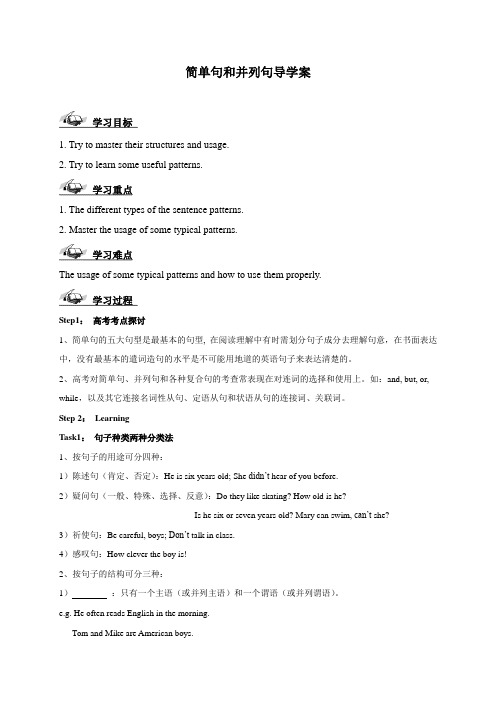
简单句和并列句导学案1. Try to master their structures and usage.2. Try to learn some useful patterns.1. The different types of the sentence patterns.2. Master the usage of some typical patterns.The usage of some typical patterns and how to use them properly.Step1:高考考点探讨1、简单句的五大句型是最基本的句型, 在阅读理解中有时需划分句子成分去理解句意,在书面表达中,没有最基本的遣词造句的水平是不可能用地道的英语句子来表达清楚的。
2、高考对简单句、并列句和各种复合句的考查常表现在对连词的选择和使用上。
如:and, but, or, while,以及其它连接名词性从句、定语从句和状语从句的连接词、关联词。
Step 2:LearningTask1:句子种类两种分类法1、按句子的用途可分四种:1)陈述句(肯定、否定):He is six years old; She didn’t hear of you before.2)疑问句(一般、特殊、选择、反意):Do they like skating? How old is he?Is he six or seven years old? Mary can swim, can’t she?3)祈使句:Be careful, boys; Don’t talk in class.4)感叹句:How clever the boy is!2、按句子的结构可分三种:1):只有一个主语(或并列主语)和一个谓语(或并列谓语)。
e.g. He often reads English in the morning.Tom and Mike are American boys.She likes drawing and often draws pictures for the wall newspapers.2) :由并列连词(and, but, or等)或分号(;)把两个或两个以上的简单句连在一起构成。
高职高考英语简单句教案
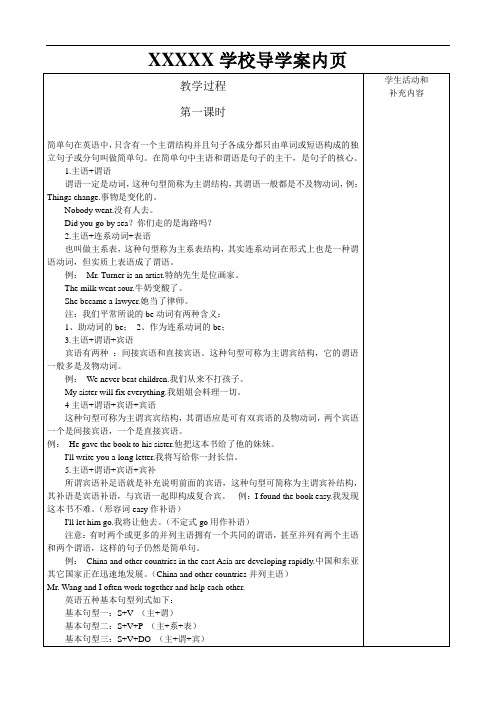
XXXXX学校导学案内页She says that I did it, doesn’t she?I told them not everybody could do it ,didn’t I?但当陈述部分的主语是I,谓语是think, believe, suppose, expect这类动词时,附加疑问部分则往往与从句中的主语和谓语动词保持对应关系,但要注意否定的转移。
I suppose that he’s serious isn’t he?I don’t th ink she cares, does she?10.当陈述部分是并列句,附加疑问句则需和就近的分句的主语和谓语一致。
如:Xiao Lin has been writing letters all afternoon but he should finish them now, shouldn’t he?11.在由“祈使句+附加疑问”构成的附加疑问句中,附加疑问部分一般用will you, won’t you, would you,有时也可用can you, can’t you, why don’t you, could you 等。
如:Don’t open the door, will you?Give me some cigarettes, can you?Take a rest, why don’t you?但是,以let’s开头的祈使句,附加疑问部分用shall we;以let us开头的祈使句,如果含义是allow us,不包括听话人在内,疑问部分用will you。
如:Let’s have a basketball match th is afternoon, shall we?Let us go out for a rest, will you?12.当陈述部分带有情态动词must表示“必须”时,疑问部分用mustn’t。
2023届高考英语单元知识点导学案(通用3篇)

2023届高考英语单元知识点导学案(通用3篇)2023届高考英语单元知识点导学案篇1XX届高考英语顶尖学案:外研版module 3 body language and non¬verbal communication 肢体语言与非语言交际核心词汇1.i was very ____________ (意识到的)of the fact that i had to make a good impression.2.i was trying to think of some way to ____________ (延长)the conversation.3.the color black is ____________ (传统地)associated with mourning.4.teachers apparently expect a certain amount of____________(挑衅性的)behaviour from boys.5.it’s too soon to make a ____________ (判断)about what the outcome will be.6.the orchestra will give two more____________(表演)this week.7.exercise classes are a good way to keep fit and improve your____________(社交的)life.8.shortly afterwards,dawson received an____________(邀请)to speak at a scientific conference.9.women have got to achieve full ____________with men in the workplace though everyone is born ____________and we all know we should treat women____________.(equal)10.people use more than words when they ____________ with each other though modern technoledge makes it easier to make ____________ than ever.(communicate)1.conscious2.prolong3.traditionally4.aggressive,5.judgement6.performances7.social8.invitation,9.equality;equal;equally municate;communications高频短语1.________________ 站岗,执勤;(保持)警惕,警戒,提防2.________________ 握手3.________________ 达成协议;做成交易4.________________ 举起;展示;支撑;阻挡;使停止5.________________ 暴露;泄漏;赠送;颁发6.________________ 对某人说再见7.________________ (被)提起,举起,抬高,吊起8.________________ 上上下下地;前前后后地,来回地9.________________ 偶然;意外地,无意中10.________________ 向……问好11.________________ 打开(灯、无线电等)12.________________ 参与,参加1.on(one’s)guard2.shake hands(with sb.)3.make a deal4.hold up5.give away6.say goodbye to sb.,7.lift up8.up and down9.by accident10.say hello to,11.switch on12.take part(in)重点句式1.perhaps________________i think.也许比我想的要多。
- 1、下载文档前请自行甄别文档内容的完整性,平台不提供额外的编辑、内容补充、找答案等附加服务。
- 2、"仅部分预览"的文档,不可在线预览部分如存在完整性等问题,可反馈申请退款(可完整预览的文档不适用该条件!)。
- 3、如文档侵犯您的权益,请联系客服反馈,我们会尽快为您处理(人工客服工作时间:9:00-18:30)。
简单句
【学习目标】掌握简单句的五种基本类型,学会区分不同的句子成分。
【学习重点】简单句的五种类
【学习难点】理解不同的句子成分。
简单句有五种类型:
1、主语 + 不及物动词(S + V)
The sun rises.
He has gone out.
They are working.
2、主语 + 及物动词 + 宾语(S + V + O)
I met him just now.
He speaks English.
I know him.
They are watching TV.
I enjoyed listening to the music.
3、主语 + 连系动词 + 表语(S + V + P)
系动词可分三类:
1.表示特征和存在状态的 be, seem, feel, appear, look, smell, taste, sound;
2.表示状态延续的 remain, stay, keep, continue, stand;
3.表示状态变化的 become, get, turn, go, run, fall, come, grow;
eg:树叶变黄了。
(turn)
4、双宾语句(S + V + IO + DO)
英语中有些及物动词可以带双宾:直接宾语和间接宾语。
直接宾语为物,间接宾语为人。
一般情况下,间接宾语在前,直接宾语在后。
若将间宾跟直宾调换,须在指人的间接宾语前加上to或for,意义上没有什么差别。
能带双宾的动词有两类:
1)give, show, send, bring, offer, pay, pass, lend, leave, hand, tell, return, write, throw, allow, wish, teach, promise, award, owe,refuse 等。
这一类动词后边的两个宾语如调换位置,间接宾语前通常加个to.
He gave us a ball. → He gave a ball to us.
注意这种句型中return 和leave两个词的意义:return作“归还”讲,leave作“留下”讲。
2)make, buy, do, fetch, get, paint, save, reserve, spare, order, cook, sing, find等。
以上这些及物动词后双宾语若调换位置,间接宾语前需加for.
Will you do me a favour? →Will you do a favour for me?
5、复合宾语句(S + V + O + C)
英语中,有些及物动词后面可带一个宾语和一个说明宾语动作或状况的成分——宾语补足语。
宾语和它的补足语合称为复合宾语,含有复合宾语的句子称为复合宾语句。
作宾语补足语的词语主要有不定式、现在分词、过去分词、形容词、名词、介词短语和副词。
宾语和它的补足语之间有逻辑上的主谓关系。
He asked me to come earlier.
I found a child sitting on the grass.
6.There be 句型
说明:此句型是由“there+be+主语+状语”构成,用以表达存在关系可以称“……有……”。
它其实是倒装的一种情况,主语位于谓语动词 be 之后,there 仅为引导词,并无实际语意。
此句型有时不用be动词,而用 live, stand, come, go, lie, remain, exist, arrive等。
如:
There stands a hill in the middle of the park.
练习一:
请辨认出下列句子的句型结构。
1.The sun rises.
2.It’s Sunday today.
3.He gave us a ball.
4.They are watching TV.
5.Mother told her child to get up early.
6.You must always keep your room clean and tidy.
7. I met him just now.
8. We study English everyday.
9. The girls run fast.
10. His face turned red.
11. There goes the bell.
12. There was only a well in the village.
练习二:
阅读下面一篇短文,分析每个句子的结构。
A very new, young officer was at a railway station. He was going to visit his mother. He wanted to telephone her to tell her the time of his train. He looked in all his pockets. But he did not have the coins for the telephone.So he looked around for someone to help him.
There was an old soldier at the station.The young officer asked him for help.。
